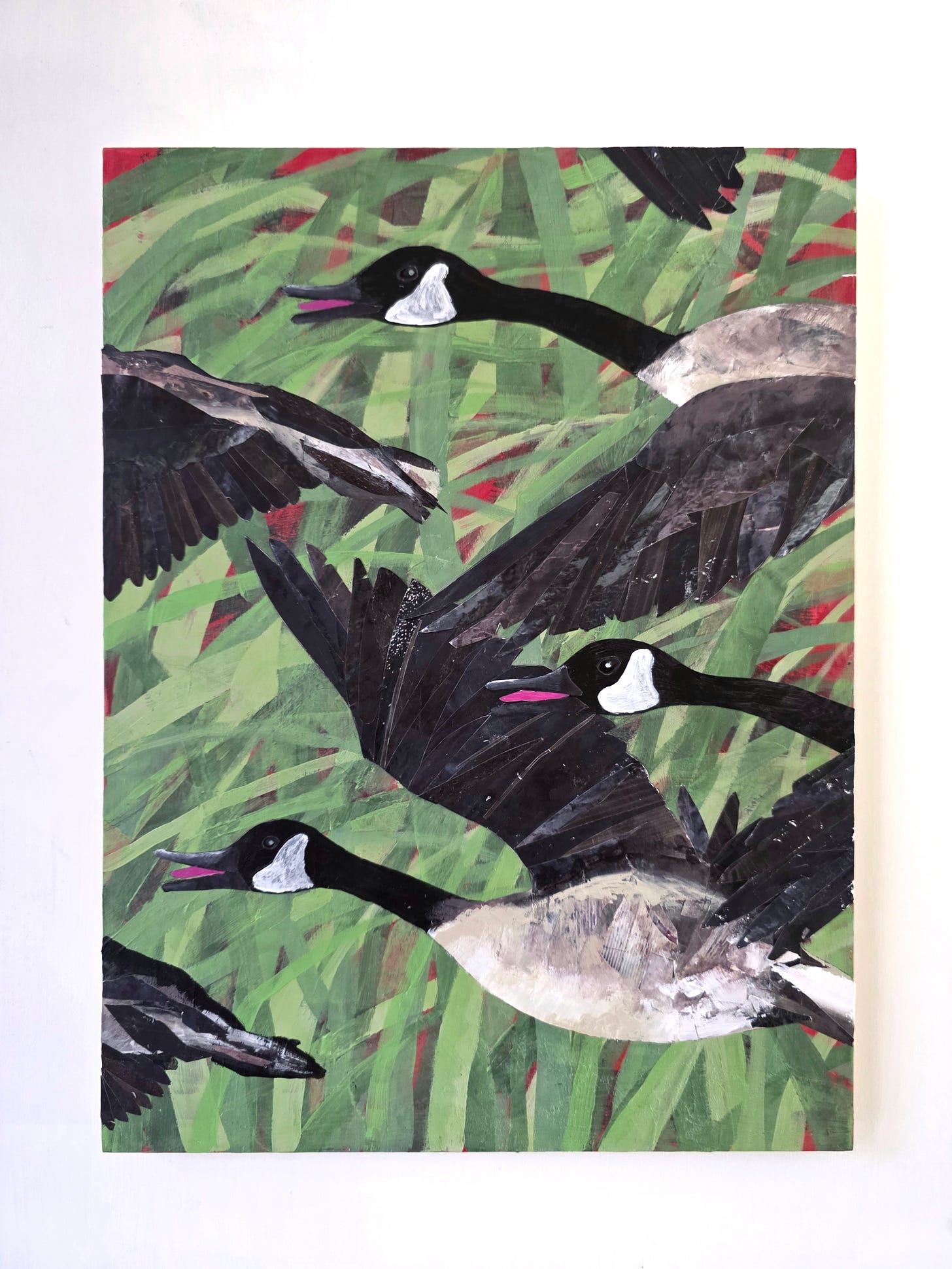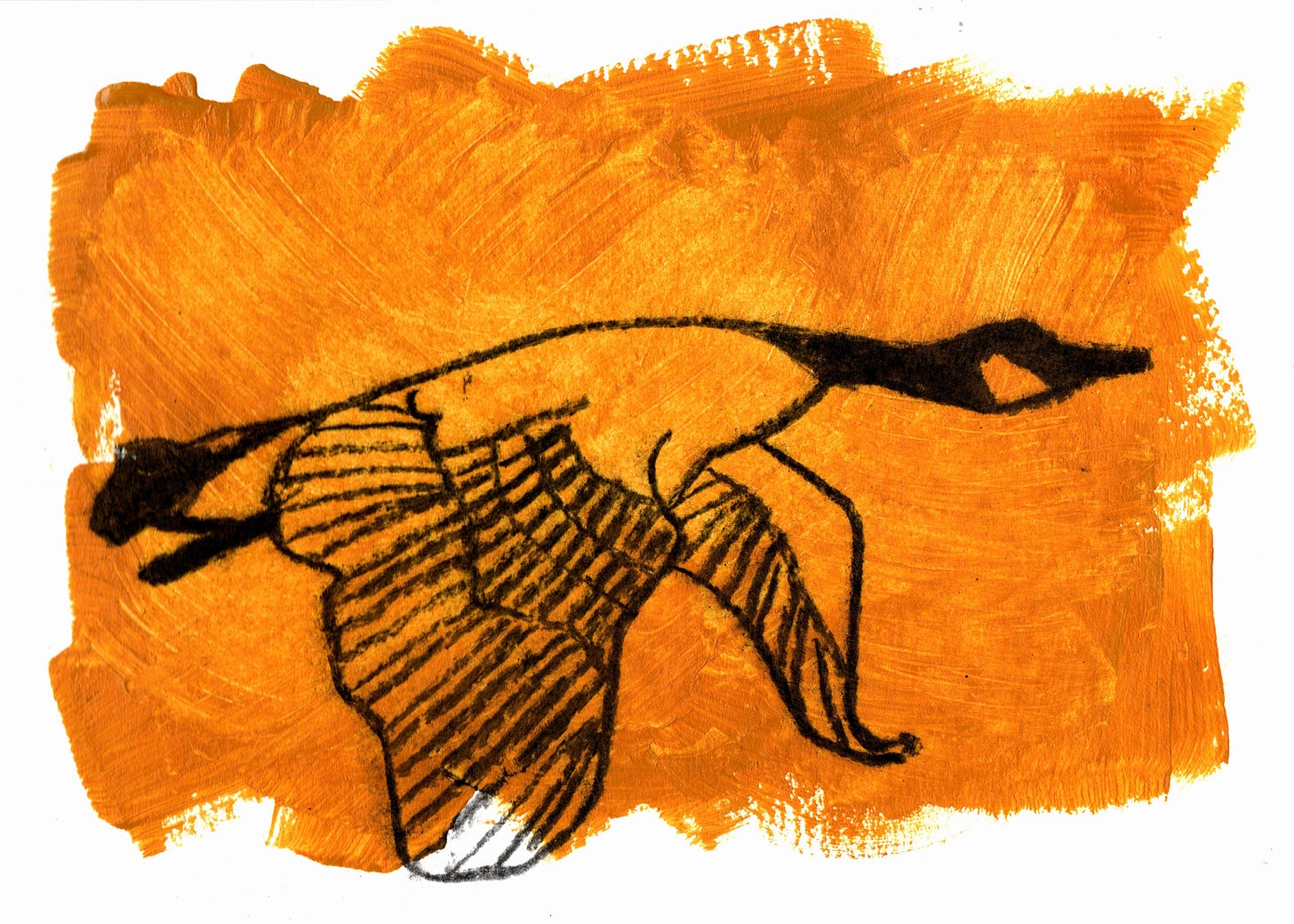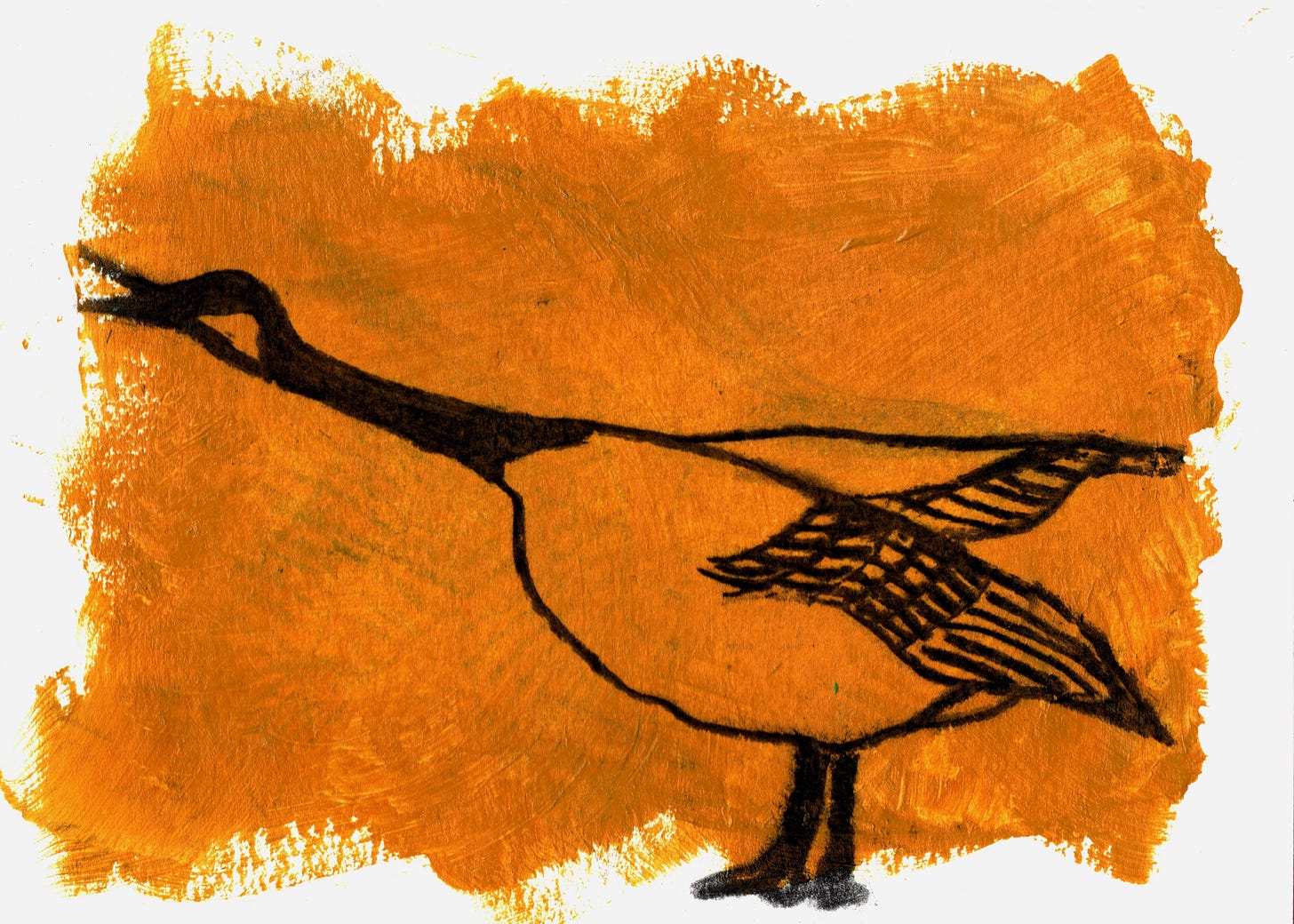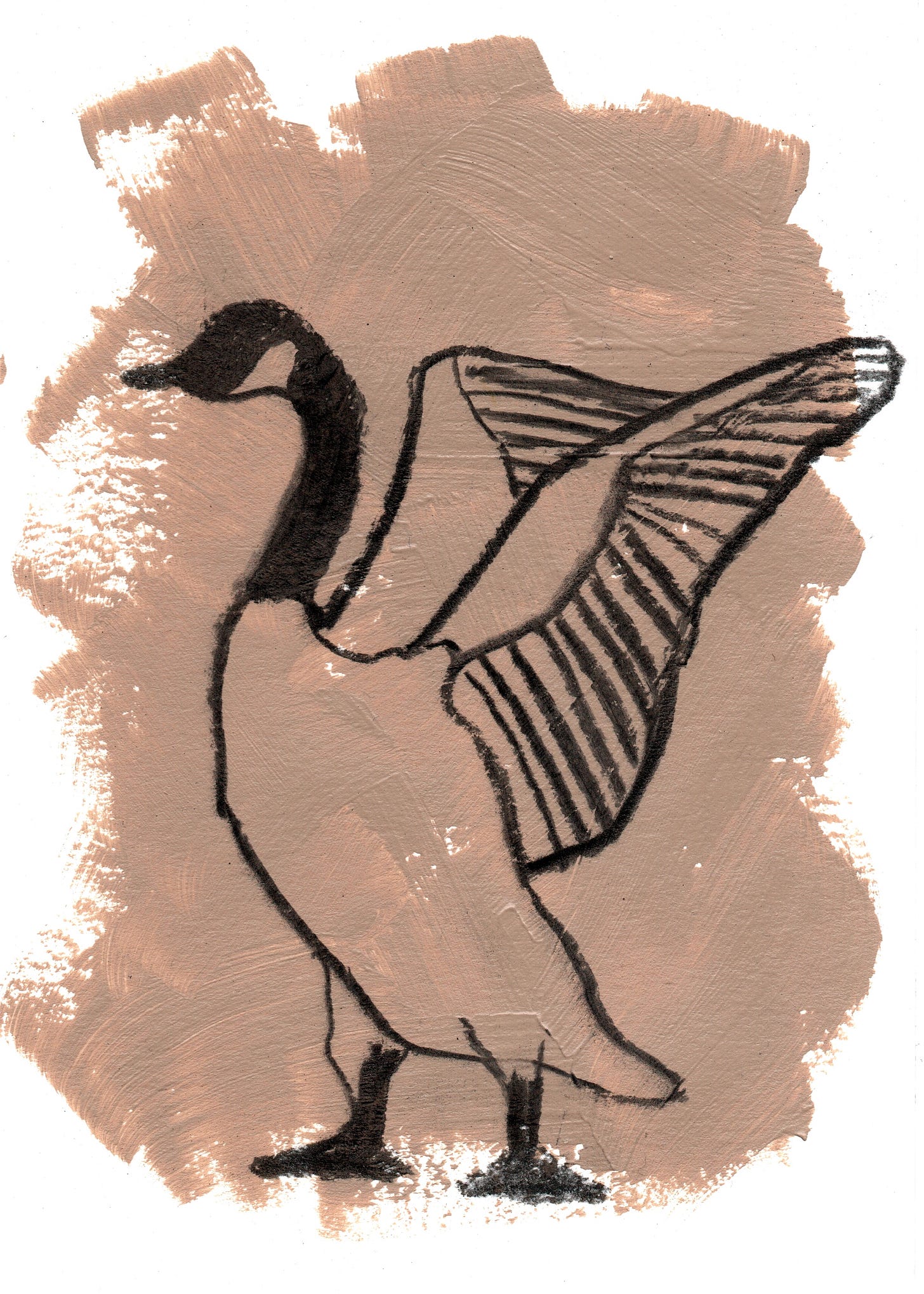
I cannot decide. Some days it seems like longing is a poison, a fog, nothing but trouble to distract me from what treasures I already hold in my hands.
Other days, longing seems like something fundamental and vital, a message. To deny it would be to erase myself in some way. An erasure that may slowly leave me faded, ghost-like, lost.
Which is true?
Are all longings equal? When our gut pulls at us, what should we listen to and what should we steadfastly ignore, trusting to a bigger picture? How can we tell what’s wise and what’s denial?
I am happy. My longings are small birds right now, but still they call, and so I wonder about all this, as I’m prone to do. I turn the problem round and round.
As geese have been my muse lately, my obsession and my joy, I found myself drawing them into the puzzle.
I present a poem and a fairytale to you, my jury. Two points of view. Two messages.
You decide.
The Prosecution: A Poem
Geese Their restless skeins pass over me, back and forth, morning, night, their sound a call, an interruption. I hear it. The longing. It pulls me up. Out of the laundry, out of the stew, out of my endless hungry thoughts, eyes closed, face to sky. "And what on earth is left for you to long for oh so loudly? You with your wide, free wings. You with your full belly. You with the whole world your map. With your feather-tip reach of kin and friend. What more could you want? Why do you still call?" These days, I know it. The sound I hear is not the goose's cry: it's mine. And the questions, the questions, they come from above. I know them all; the parts of me, long gone, that flapped with frantic flight towards some ripe and tempting thing. Hundreds, thousands, enough to fill the sky. How they lifted, ragged, yearning, to try and leave it all this behind, while down below my emptied self ignored her nest, her chance. I'll feel it now: some fresh and feathered thing pulls inside me still. The anger I feel is its fight to get free, kin calling kin. Maybe this time. Maybe this. God bless the wide-mouthed, faithful geese, blessed with their high view. They chose their path to call a warning to the misplaced stranger seeking flight once more: "Turn back, dear child. Go home."
The Defence: A Fairytale
(based loosely on The Goose Girl)
There was once a girl who decided it was time to leave her mother and make her way out into the wide world. Her mother wept but understood, remembering the time she too had felt the call. She knew there was no denying it. But because she remembered too what had happened when she had journeyed out on her own, she insisted the girl take two things with her.
The first was a white goose feather which she tucked into the girl’s hat. The second was the mother’s old, white mare named Falada — a rare and loyal horse who could speak.
“Falada goes with you to help remind you of what’s true. The feather is so you may better hear your soul’s voice. Keep both close and you’ll know what to do,” the girl’s mother said.
And so, the girl left, her heart sore, her hands tight on Falada’s reins as she tried not to look back. Her new clothes itched and rubbed as she rode. She had left behind her old soft cottons and donned unfamiliar clothes better suited for a new life. They felt tight and strange.
“I’ll get used to them,” the girl reassured herself, as the cottage dwindled behind her.
The girl had long schemed and formed her plan and so she set her path confidently: she would go to the big city; she had it all worked out. But the journey there was long, the road dry and dusty, and the girl soon tired. A fierce thirst parched her throat and stung her eyes.
“I feel drained dry already. How weak I am!” she cried, and at her words, a wind picked up, lifting the feather from her hat to dance in front of her.
“Come, child,” Falada the horse said, “the feather knows a place.”
The feather floated and leapt along on the breeze and, following its path, the old mare led them off the road to a copse of whispering beech trees. There, through the middle, ran a cool, clear brook.
“Oh I would love to drink and bathe,” the girl said, feeling a pull deep in her body towards the water, “but no, I haven’t got time. Come on, Falada, we really must get on.”
She snatched the feather from the air and tucked it firmly back in her hat. “In the city, there are better things — hot baths, sweet wine. There I’ll have everything I need,” she reassured herself. In front of her, Falada sighed.
The girl and her horse travelled on, but it wasn’t long before the aching pangs of the girl’s belly made her groan.
“Oh, I am so hungry. How pathetic I am, we’ve barely gotten started!” said the girl.
At her words, the feather perked up again and, throwing itself into the wind, began to dance its way in a new direction. Falada followed it, despite the girl tugging grumpily at her reins. “Falada, we need to keep going! We’ll never get to the big city at this rate.”
“But you’re hungry, child. And look, the feather has led us to food.”
Sure enough, there was an inn, the scent of fresh bread heavy in the air and the sound of people laughing in companionship and merriment. A scullery girl her own age leaned out of the window, giving her a cheerful wave.
“No,” said the girl, tucking the feather back in her hat, “we’re going to the city. In the city, there is better fare. I’ll have everything I need.”
But, oh, as she steered them back onto the hard road, the pull that came from her body nearly split her clean in two, and unseen by the girl, her haughty head held high, Falada wept soft tears as she plodded faithfully on.
At last, the city was in sight, a grey smudge on the horizon, but the girl was so tired, her head drooped and her eyes closed as she fought to stay awake, slipping in the saddle.
“Oh this weak and useless body,” she cried, full of rage. At her words, the feather leapt from the girl’s hat again to flit and float along another path, and Falada followed, the girl too weak now to wrestle back control.
“Look, child,” said Falada, “it’s a place that you can rest. Come now, the signs are undeniable. Why not here?” And there ahead was a lush green field, its grass long and soft and inviting.
“No,” snapped the girl, and this time she snatched at the feather, breaking it in two. She let it fall to the ground at Falada’s feet. “I’m so close. In the city, I’ll sleep in a soft bed every night; I’ll have everything I need!”
But this time the pull from her body towards the soft grass was so strong that the pain of it made the girl cry out and she fell from Falada’s back and onto the hard road. The impact of it weakened the crack that had been growing and growing in the girl since she had left the cottage, and as she picked herself up to brush herself down, she was horrified to realise that she really had split clean in two. For here now was her twin, standing in front of her.
The girl’s other half stared back with her mouth open in surprise. The new twin looked just like the girl in every way, except that where the travelling girl’s clothes were fine and respectable, the new girl was dressed in loose, old things. The new girl smiled and held out her hands, but the determined twin shook her head, horrified, and gestured her away.
“Shoo! Shoo! Begone with you!” and she bared her teeth at the new, smiling twin, and shouted every insult and curse she could think of, until the new girl’s smile faltered, her eyes wet now like Falada’s, and the poor girl began to back away.
The ruined feather on the ground gave a twitch. The sad twin bent to pick it up. And at that moment, a great skein of geese flew overhead, their mouths open, the sky full of their rasping calls. The twin looked up delighted and with one last look at our prim and proper adventurer, turned on her heel, the feather in her hand, and ran off through the field until she was out of sight. As the girl watched, she saw a lone white goose rise from the horizon to join its kin.
“Disaster,” wailed Falada, moving as if to follow the geese. “Oh child, it’s not too late. Follow them! Follow her!”
“Shut it, you,” the girl hissed, and mounting the saddle roughly, she kicked her heel into Falada’s side and steered back towards the city until finally, finally, she arrived to its embrace.
She found a new life waiting, just as she’d hoped, and the first thing she did was have Falada’s head cut from her nagging shoulders, so she may never again speak of the life and choices that had come before her.
Time passed. The girl was soon a woman, and before long, not a young woman either.
Did the longing leave her?
Never. She tried not to think about it.
She pushed it down and down, as deep as Falada’s head in the ground.
But, however, hard she tried, there were times when standing at the window of her fine house, the evening light drawing out the day’s shadows, a call from above would startle her out of thought. She’d lift her head to see the geese arrowing across their sky, one snowy goose in their wake.
The joyful sound they made would make her heart ache. A great cavernous loss would echo right through her and, although she could barely remember why now, she would wonder, what clue she’d missed, what it was she’d lost, and how she could have possibly gone so wrong.
Up above,
The geese still call.
“It’s not too late.
Falada still speaks.
Dig her up.
Leave your comfortable bed.
Come find us, here: be whole.”
This blog and my whole career exists thanks to the generosity and support of my patrons.
Those of you who become paid subscribers or who so kindly throw some money in the pot via KoFi: you are the ones who make all my work possible. I have no other income right now and by upgrading or tipping, you help give me the freedom and permission to make the big, brave work I want to make — the novel that edges ever closer to completion, blogs like this, my drawings and paintings.
Thank you, all of you, for being here. I have so much I want to give the world. You help me to offer it up freely, and for that I am forever grateful.





The severing, and burying, of the horse's head- the trade-off we make, perhaps all of us make, to follow a path into the overstory, the 'should' path. But the buried longing continues on, and the geese carry it and call it and will never stop calling. It's not an either/or, is it?- rather finding a way to bear the terrible and beautiful choices we make, and those we don't make.
Beautiful Josie. Reminds me of Rumi’s poem Love Dogs. The longing is the fulfilling. I wrote a piece in defense of longing a while ago, you may find it a nice accompaniment to your wisdom.
https://unfixed.substack.com/p/in-defense-of-longing